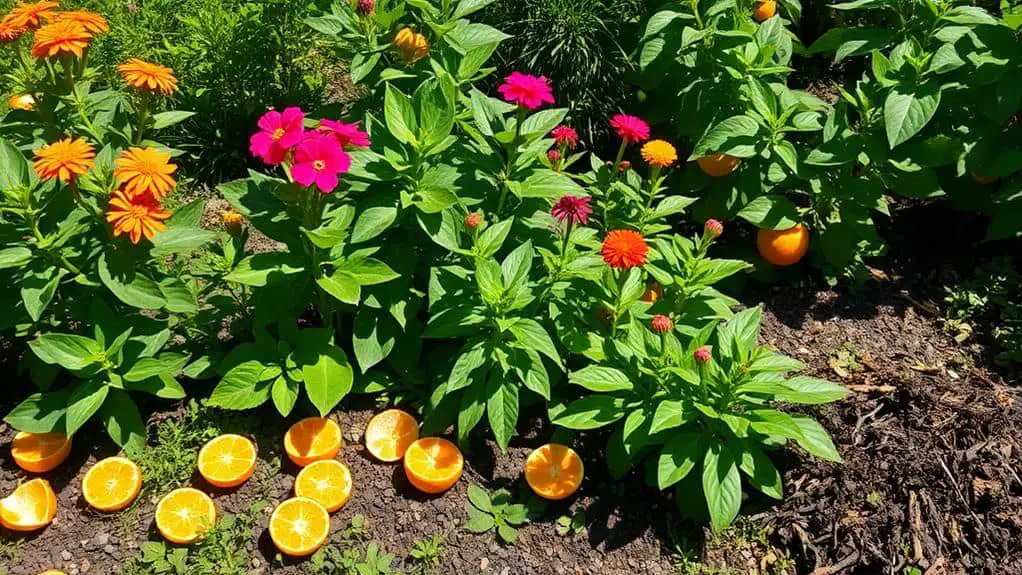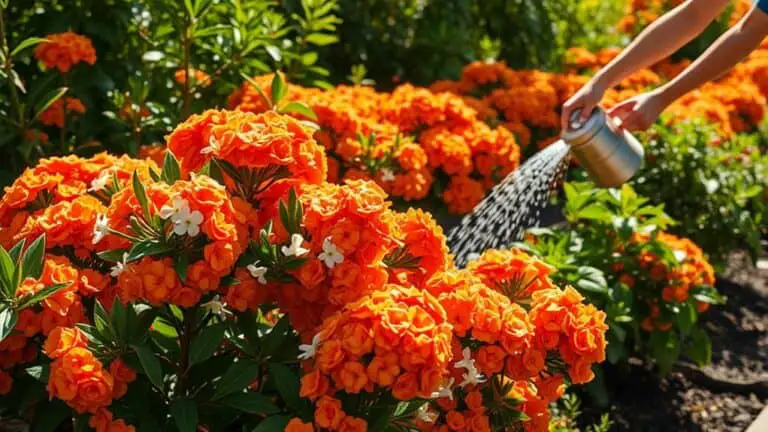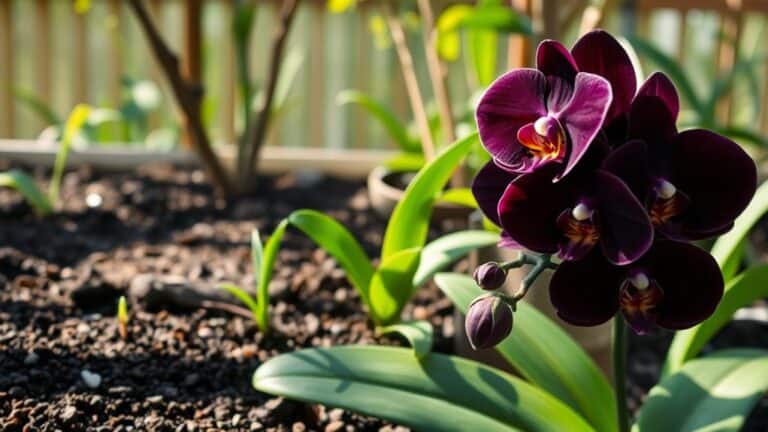Why Do People Use Orange Peels In The Garden
I've always been curious about the various uses of kitchen scraps in the garden, and orange peels are particularly intriguing. You might wonder why gardeners are so keen on tossing these citrus leftovers into their flower beds. It turns out, orange peels serve multiple purposes, from repelling pests to enriching soil with valuable nutrients. This practice not only reduces kitchen waste but also supports a more sustainable gardening approach. But there's more to it—have you ever considered how these peels can be a cost-effective alternative to chemical pesticides? Let's explore this fascinating topic together.
Pest Deterrent Properties
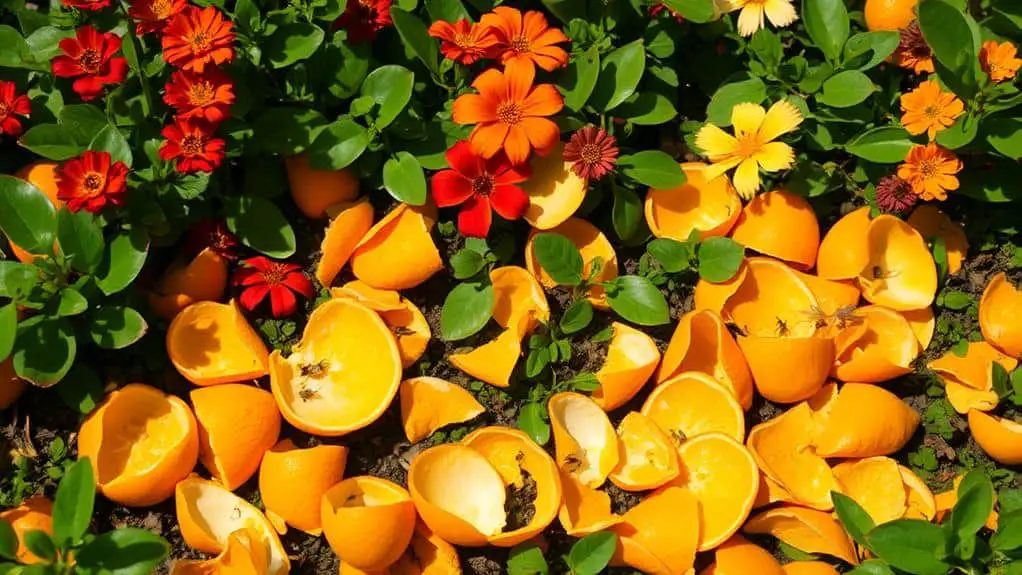
When it comes to keeping pests out of your garden, orange peels can be a game-changer. The strong citrus scent of orange peels effectively repels pests like slugs, aphids, and ants. These pests rely on specific aromas to find food, and orange peels disrupt that process.
Fresh orange peels contain limonene, a natural insecticidal compound. This makes orange peels a powerful pest deterrent. Simply scatter chopped orange peels around your plants to create a non-toxic, eco-friendly barrier.
Not only do orange peels deter pests, but as they decompose, they also add valuable nutrients to the soil. Remember to replace the peels regularly to maintain their effectiveness and keep your garden thriving.
Nutrient-Rich Compost
Adding orange peels to your compost can really boost your soil's fertility.
These peels break down faster when chopped or shredded, speeding up the decomposition process and mixing well with other kitchen scraps like banana skins and eggshells.
As they decompose, they enrich the compost with essential nutrients and attract beneficial microorganisms, making your garden soil healthier and more productive.
Enhancing Soil Fertility
Orange peels can work wonders for your garden by greatly boosting soil fertility through nutrient-rich compost. When you add orange peels to your compost, they break down and release essential nutrients like nitrogen, phosphorus, and potassium. These nutrients are crucial for healthy plant growth.
By chopping or shredding the peels, you help them decompose faster and blend better with other compost materials. This process improves the soil structure, making it easier for roots to grow, and enhances moisture retention and drainage.
Additionally, the organic matter from decomposed peels attracts beneficial microorganisms that maintain soil health. So, don't toss those orange peels; use them to create a thriving garden!
Accelerating Decomposition Process
By chopping your orange peels into smaller pieces, you'll greatly speed up their decomposition process, making it easier to integrate them into your compost. Orange peels decompose faster this way, releasing their rich nutrients, like nitrogen, phosphorus, and potassium, into the compost. These nutrients enhance soil fertility, making your garden healthier. The high moisture content in orange peels also helps keep the compost moist, which is essential for beneficial microorganisms to thrive. Adding orange peels regularly improves soil structure and drainage, creating a better environment for your plants. Plus, using orange peels in compost supports sustainable gardening by recycling kitchen waste and reducing food waste.
| Benefit | Description | Result |
|---|---|---|
| Faster Decomposition | Smaller pieces break down quicker | Easier compost integration |
| Nutrient-Rich | High in nitrogen, phosphorus, potassium | Enhanced soil fertility |
| Moisture Balance | High moisture content | Promotes microorganisms |
| Improved Soil Structure | Better structure and drainage | Healthier plants |
| Sustainable Gardening | Recycles kitchen waste | Reduces food waste |
Homemade Fertilizer
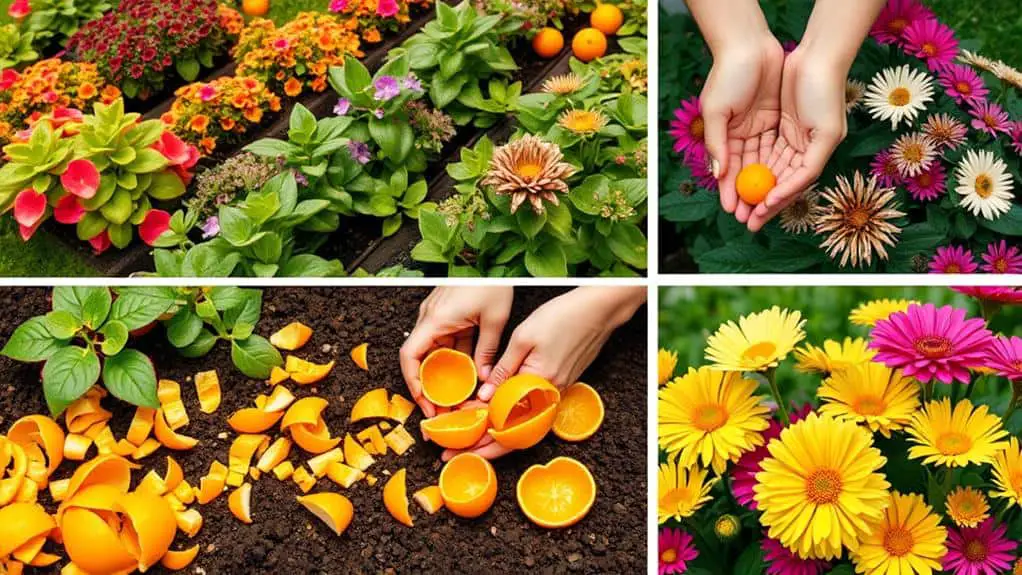
Let's talk about how you can make your own fertilizer at home using orange peels.
By soaking chopped peels in water, you can create a nutrient-rich liquid tea to water your plants.
Alternatively, you can dry and grind the peels into a powder that slowly releases nutrients, helping your plants grow strong and healthy.
Nutrient-Rich Liquid Tea
Creating a nutrient-rich liquid tea from orange peels is an incredibly simple yet effective way to boost your garden's health. By soaking orange peels in water, essential nutrients like nitrogen, phosphorus, and potassium leach into the liquid, creating a homemade fertilizer. This method is cost-effective and eco-friendly, enhancing plant health without synthetic fertilizers. The nutrient-rich infusion can be used directly to water plants, offering a slow-release source of nutrition that improves soil quality.
Here's a quick overview:
| Benefit | Nutrient | How It Helps |
|---|---|---|
| Boosts plant health | Nitrogen, Phosphorus | Enhances growth |
| Improves soil quality | Potassium | Better root development |
| Cost-effective | Natural sources | Saves money |
| Eco-friendly | Organic peels | Reduces waste |
| Moisture retention | Infusion properties | Healthier roots |
Soak peels for at least 24 hours before using the liquid as fertilizer.
Powdered Peel Fertilizer
Drying and grinding orange peels into a fine powder creates a powerful homemade fertilizer that can greatly enhance your garden's health.
This powdered orange peel fertilizer is rich in essential nutrients like nitrogen, phosphorus, and potassium, which are crucial for plant growth.
To make your own, simply dry the peels thoroughly in a low oven, then grind them into a powder.
You can mix this nutrient-packed powder into the soil or sprinkle it around your plants.
This method improves nutrient availability as the powder slowly decomposes, enriching the soil over time.
Using powdered orange peels as a homemade fertilizer not only recycles kitchen waste but also supports sustainable gardening practices.
Balanced Nutrient Release
Making powdered peel fertilizer is a fantastic way to enrich the soil, but there's another method that guarantees a balanced nutrient release for your garden. Soaking chopped orange peels in water creates a nutrient-rich tea that you can use for watering plants. This liquid provides essential nutrients like nitrogen, phosphorus, and potassium, enhancing plant growth and health. Alternatively, dried and ground orange peels can be sprinkled around plants, delivering a slow-release fertilizer that enriches the soil over time. This method improves soil structure and moisture retention. Recycling kitchen waste like orange peels supports sustainable gardening.
| Orange Peel Form | Nutrient Release | Method | Benefits |
|---|---|---|---|
| Liquid Tea | Quick | Soaking in water | Immediate plant boost |
| Powdered | Slow | Sprinkling on soil | Long-term soil enrichment |
Using these methods guarantees your garden thrives.
Eco-Friendly Gardening
Often overlooked in our everyday lives, orange peels can be a surprisingly effective tool for eco-friendly gardening. By using orange peels, we can deter pests naturally. The citrus scent repels common garden pests without harmful chemicals.
Adding orange peels to your garden also helps reduce kitchen waste. This practice promotes sustainability and aligns with organic gardening principles.
Orange peels are rich in nutrients like nitrogen, phosphorus, and potassium. These nutrients enhance soil fertility and plant growth naturally.
Using orange peels supports sustainable practices by encouraging biodiversity and reducing the need for synthetic fertilizers and pesticides. Regularly incorporating fresh orange peels into your garden enriches the soil and creates a healthier ecosystem, making it a wonderful choice for eco-friendly gardeners.
Cost-Effective Solution
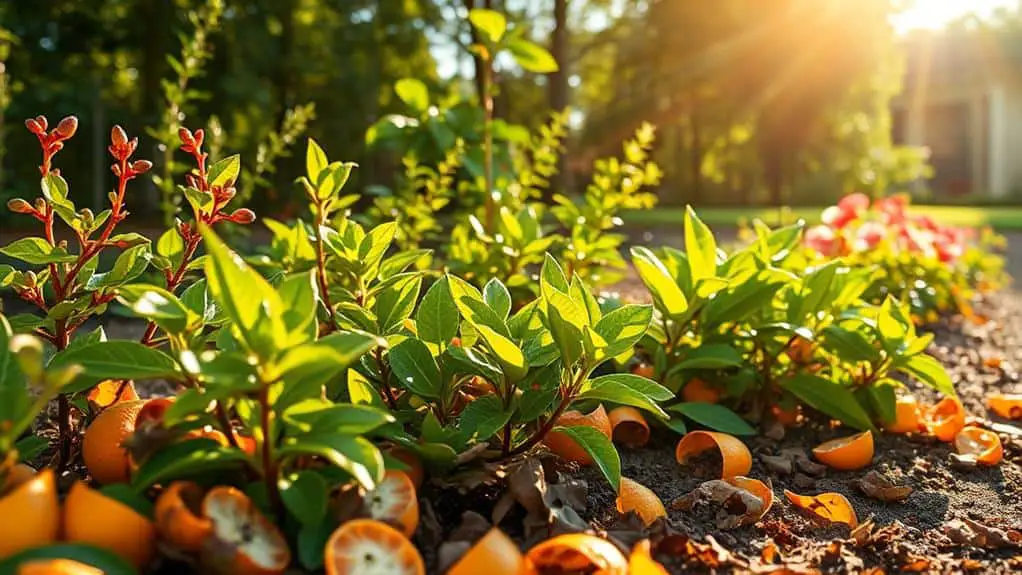
Leveraging kitchen waste like orange peels in the garden isn't just eco-friendly—it's a cost-effective solution too. Orange peels serve as a natural pest deterrent, reducing the need for pricey chemical pesticides. They enrich the soil with organic matter, providing essential nutrients like nitrogen, phosphorus, and potassium. This means you don't have to buy as much fertilizer.
| Benefit | Cost Savings | How It Helps |
|---|---|---|
| Natural pest deterrent | Less spent on pesticides | Keeps harmful insects away |
| Soil enrichment | Reduces need for fertilizer | Boosts plant growth |
| Mulching | No need for commercial mulch | Suppresses weeds, conserves moisture |
Using orange peels in these ways helps you save money and maintain a healthy, organic garden.
Methods of Application
Not only are orange peels a cost-effective solution, but they also offer various practical methods to enhance garden health.
For instance, you can boil fresh orange peels in water, strain the mixture, and store it in a spray bottle. Spraying this on your plants every 3-4 days helps control pests.
Another method is chopping fresh orange peels into small pieces. Scatter these chopped-up orange peels around the bases of your plants to create a natural pest barrier.
To make them even more effective, soak the peels in white vinegar before application. Remember to place the peels near entry points and replace them regularly to maintain their potency.
These simple steps can make a big difference in your garden.
Maintenance Tips
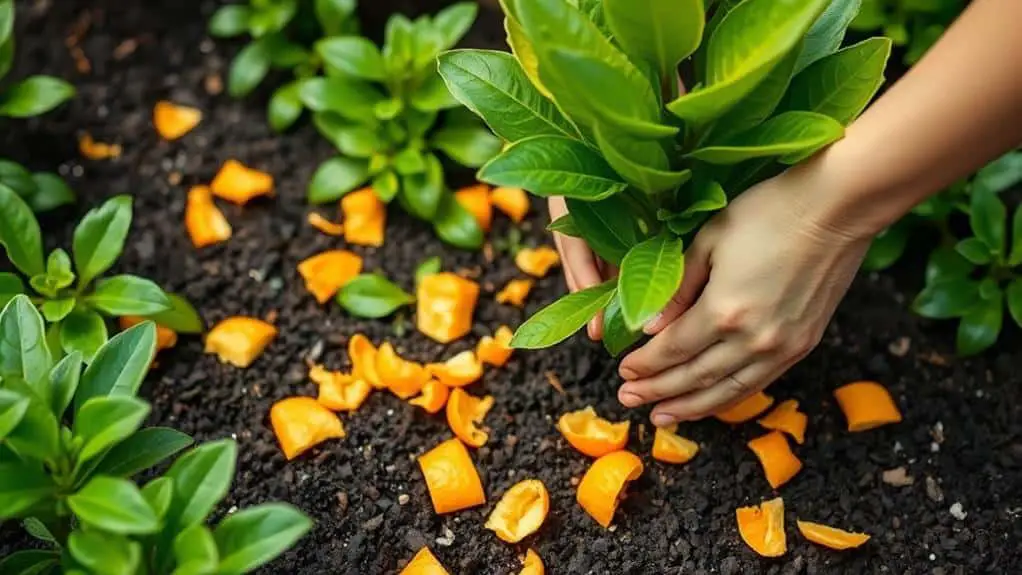
Keeping your garden healthy with orange peels requires a few essential maintenance tips.
First, regularly replace orange peels every few days. This helps maintain their effectiveness as a pest deterrent and prevents mold growth. Only use the peels, not the orange flesh, to avoid attracting unwanted insects.
Monitor the peels around your plants and remove any that have dried out or decomposed to keep your garden looking nice. Place fresh orange peels strategically near pest entry points and during peak pest seasons.
For faster decomposition and nutrient release, consider chopping or grinding the peels into smaller pieces.
Potential Drawbacks
When considering the use of orange peels in your garden, be aware of some potential drawbacks.
Orange peels can attract larger pests like wasps and rodents, which can lead to unwanted infestations. To maintain a clean and effective garden, you'll need to replace the peels regularly to prevent mold growth. This maintenance can be time-consuming.
If you use too many orange peels, especially those with flesh, you might disrupt the garden ecosystem by attracting more pests rather than deterring them. Furthermore, dried orange peels lose their pest-deterring effectiveness over time.
Additionally, the high acidity of citrus peels can negatively alter your soil's pH, potentially harming plants that prefer neutral to alkaline conditions.
Use orange peels wisely to avoid these issues.
Organic Gardening Practices
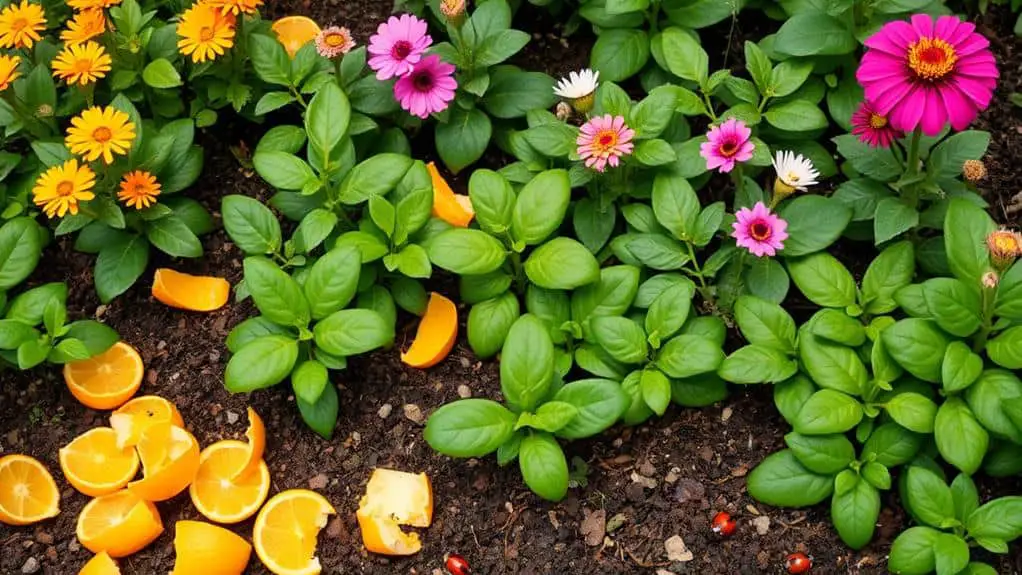
Many organic gardening enthusiasts swear by the benefits of using orange peels. When I use orange peels, I'm adding valuable nutrients like nitrogen, phosphorus, and potassium to my compost. This enriches the soil fertility, making it healthier for my plants.
Also, since I'm not relying on synthetic chemicals, my garden stays more sustainable and eco-friendly. The strong citrus scent from the peels helps keep pests away, reducing the need for harmful pesticides.
Common Myths
While I've seen great benefits from using orange peels in my garden, I've also encountered several myths that can mislead fellow gardeners. One common myth is that orange peels universally deter pests. In reality, their effectiveness varies and diminishes when dried. Another misconception is that orange peels can deter slugs, but evidence shows slugs might be attracted to citrus. Additionally, some believe the citrus oil in peels reaches pest-repelling concentrations, but kitchen scraps don't provide enough. Finally, the belief that citrus peels are safe for all plants ignores the fact that their high acidity can harm sensitive species if overused.
| Myth | Reality |
|---|---|
| Universally deter pests | Effectiveness varies and diminishes when dried |
| Deter slugs | Slugs may be attracted to citrus |
| High citrus oil concentration | Kitchen scraps lack sufficient amounts |
| Safe for all garden plants | High acidity can harm sensitive plants if overused |
Frequently Asked Questions
Is It Good to Put Orange Peels in Your Garden?
Yes, it's good to put orange peels in your garden. They provide compost benefits, enrich the soil with essential nutrients, and act as an organic fertilizer. You'll enhance soil fertility and promote healthier plant growth naturally.
Which Plants Like Orange Peels?
I use orange peels for plants like blueberries, azaleas, tomatoes, and peppers. The citrus benefits, peel nutrients, and composting tips help improve soil health and repel pests, making them great for my garden.
What Garden Pests Do Orange Peels Repel?
I've found that orange peels' citrus scent benefits my garden by acting as a natural pest deterrent. They repel aphids, slugs, and ants. Plus, composting orange peels adds nutrients to the soil, promoting healthier plant growth.
Are Orange Peels Good for Tomato Plants?
I've found that the orange peel benefits for tomato plant nutrition are plentiful. They enrich the soil with essential nutrients, enhance microbial activity, and improve soil structure. For organic gardening tips, orange peels are invaluable.
Conclusion
Using orange peels in your garden is a fantastic, eco-friendly way to keep pests at bay and enrich your soil. It's simple and cost-effective, making gardening easier and more enjoyable. Don't worry if you're new to this; everyone starts somewhere. By incorporating orange peels, you'll be well on your way to a healthier, more vibrant garden. So, give it a try and watch your garden thrive. Happy gardening!

